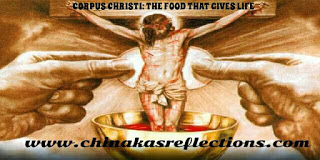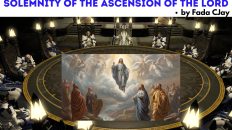THE FOOD THAT GIVES LIFE
Every living organism on earth needs some basic things to stay alive. The traditional list of immediate “basic needs” of man is food (including water), shelter and clothing. Food (proper nutrition) helps in providing the body with sufficient energy to function properly. Energy is needed for the body metabolism – to grow, reproduce, move, and to work etc. It follows then, that without food (that is, proper nutrition), our body cannot survive. In the same path, man, as a spiritual being ought to be nourished and sustained spiritually in order to be spiritually alive. This becomes clearer when Jesus says: “It is the Spirit who gives life…” (Jn. 6:63). In the preceding verse, Christ already made an explicit reference to his flesh as the life-giving bread. In his very words, viz: “I am the living bread that came down from heaven; whoever eats this Bread will live forever; and the bread that I will give is my flesh for the life of the world […] for my flesh is real food and my blood is real drink” (Jn. 6:51-58). Considering the foregoing, we see a strong link between the “Bread of Life” and the Holy Spirit, in relation to giving life. At His last supper, Christ makes it more transparent: “TAKE AND EAT…THIS IS MY BODY WHICH WILL BE GIVEN UP FOR YOU; TAKE AND DRINK…THIS IS MY BLOOD…” (Lk. 22:19). Dearest friends in Christ, this is the hallmark of our Celebration this Sunday: “THE SOLEMNITY OF THE BODY AND BLOOD OF CHRIST” (CORPUS CHRISTI).
The Sacrament of the Body and Blood of Jesus Christ (also known as the Holy Eucharist) is the greatest treasure given to the Church by Christ himself at the last supper as food for our souls, and He orders: “DO THIS IN MEMORY OF ME”. Due to its connection with the Holy Spirit, the giver of life, whenever we receive the Body and Blood of Christ, our spiritual life is nourished and sustained by the Holy Spirit. Put differently, whenever we receive the Eucharist, we receive the Holy Spirit, the giver of life. Starting with the words of the Nicene-Constantinople Creed which defines the Holy Spirit as “Lord and giver of life… who spoke through the prophets”, the perspective then widens to outline a real “history” of the Holy Spirit. He (the Holy Spirit) has always acted where life is given. Recalling the words of the renowned Franciscan preacher of our time, Father Raniero Cantalamessa: “At the beginning of time, Adam was just an inertial mass of mud, but it received the ‘breath of life’ and became a living being. When it was time for the New Adam (Jesus) to come, the Holy Spirit again intervened with Mary and created the physical life of the Saviour in her. In the Cenacle, we find a handful of frightened and doubtful men, a sort of inert body, like that of the first human being; then the Spirit breathed on them and they became a living Church”. He continues: “The Eucharist brings a series of wonderful events to fulfilment. The Holy Spirit, who at Easter bursts into the sepulchre, “touches” Christ’s Body and gives Him life again, repeats this wonder in the Eucharist. He comes upon the dead elements of bread and wine and gives them life (by the epiclesis); He makes them into the Body and Blood of the Redeemer. Truly, as Jesus himself says, “it is the Spirit that gives life” (Jn 6:63)
Theodore of Mopsuestia, a master of Eastern Eucharistic Tradition wrote: “When the priest declares that the bread and wine are the Body and Blood of Christ, he affirms that this has come about through the Holy Spirit. It is the same as what happened to Christ’s natural body when it received the Holy Spirit and his unction. At the moment the Spirit comes, we believe that the bread and wine receive a special unction of grace. And from then on, we believe they are the Body and Blood of Christ, immortal, incorruptible, and immutable by nature…” In the same current of theological reflections, St. Ambrose exclaimed: “Do you see the effectiveness of Christ’s words? Now we know where this effectiveness comes from: from the Holy Spirit” Jesus says: “This is My Body,” as if he were saying: I want this bread to be my Body! And the Holy Spirit fulfils the Will of Jesus each time. This is how that marvellous “collaboration” is fulfilled: at the consecration the Holy Spirit gives us Jesus so that at communion, Jesus can give us the Holy Spirit.
This was the doctrine taught by Christ to the hungry Jews of his time and they failed to understand him, rendering it a very hard teaching, and many of them deserted him. The context of that passage (Jn. 6: 51-58) would be well understood when we read from the beginning of that chapter. The chapter opens up with the miracle of Jesus – the multiplication of loaves and fishes. We read that, after feeding them to their satisfaction, they began to follow Jesus hoping that he would give them more food to eat. Here, they were concerned with the material benefit of filling their stomachs and quenching their hunger. To teach them that man does not live on bread alone but on every word that proceeds from the mouth of God, Jesus (in verse 26 and 27) had to tell them the bitter truth. “In truth, I tell you, you are looking for me not because you have seen the signs but because you had all the bread you wanted to eat. Do not work for food that goes bad, but work for food that endures for eternal life, which the Son of man will give you, for on him the Father, God himself, has set his seal. Then they said to him, ‘What must we do if we are to carry out God’s work?” It was in this context that Jesus made them understand that they must make efforts to seek for the spiritual food in order to achieve life in its fullness. Thus, he came up with the doctrine of HIS BODY AND BLOOD (which we read today in the Gospel). They failed to understand what He meant by saying “Unless you eat the flesh of the Son of Man and drink his blood, you have no life in you”. According to the Gospel Reading: “The Jews quarrelled among themselves, saying, ‘How can this man give us his flesh to eat?’ Jesus said to them, Amen, Amen, I say to you unless you eat the flesh of the Son of Man and drink his blood, you do not have life within you. Whoever eats my flesh and drinks my blood has eternal life, and I will raise him on the last day. For my flesh is true food, and my blood is true drink. Whoever eats my flesh and drinks my blood remains in me and I in him. Just as the living Father sent me and I have life because of the Father, so also the one who feeds on me will have life because of me. This is the bread that came down from heaven. Unlike your ancestors who ate and still died, whoever eats this bread will live forever.”
In this regard, the First Reading (Dt. 8:2-3, 14b-16a) tells of the manna the “ancestors” ate. It is important to understand that the manna of the Old Testament is a prototype of the Eucharist of the New Testament. God feeds the hungry Israelites struggling in the desert with manna (bread from Heaven); the food of angels (Psalm 78:25). The Israelites were forbidden from storing more than one day’s supply of the manna so that they would learn to trust in God’s providence. Just so, Jesus feeds us with the bread of heaven, His Body, and Blood, while we struggle in our lives, which can certainly resemble wandering in a desert at times. And in the Lord’s Prayer, we’re to pray, “Give us this day our daily bread” (Mt. 6:11). That immediately sounds like the manna. But it gets better, instead of asking for our bread for “this day,” or our “daily bread,” we’re asking for our daily bread this day. It’s strangely redundant. It turns out that the Greek word here for “daily” is a neologism — we know of no use of it prior to Mt. 6:11 itself. And it turns out that it literally means “super-substantial.” So a more accurate translation would be like St. Jerome’s translation of these words into Latin, in which we ask for our daily, supersubstantial Bread. That makes clear that the new Manna we’re to eat is supernatural food. In consonance, Paul calls manna in the Old Testament “supernatural food” in 1 Corinthians 10:3, and how much more supernatural the Eucharist is. In the same chapter, to drive home his point (in 1 Cor. 10:16-17) – the Second Reading, Paul rhetorically speaks of the bread and the wine as a participation in the Body and Blood of Christ.
Dear friends in Christ, we should consider ourselves privileged for beholding this great revelation of God, for understanding the teachings of Christ Jesus – the Eucharist. Thus, if we remove the Eucharist from our faith, our religion becomes empty, and cannot function; we need the daily effects of the Eucharist to continue to function spiritually. Therefore, we are called to continue to praise and glorify the Lord like the Psalmist of the day (Ps 147:12-13, 14-15, 19-20): O praise the Lord Jerusalem…for He feeds us with FINEST WHEAT (i.e. the Eucharist), He has made known his statutes and his ordinances to Israel (We are the Israelites of today – God’s chosen people). He has not done thus for any other nation; his ordinances he has not made known to them.
Shalom!




